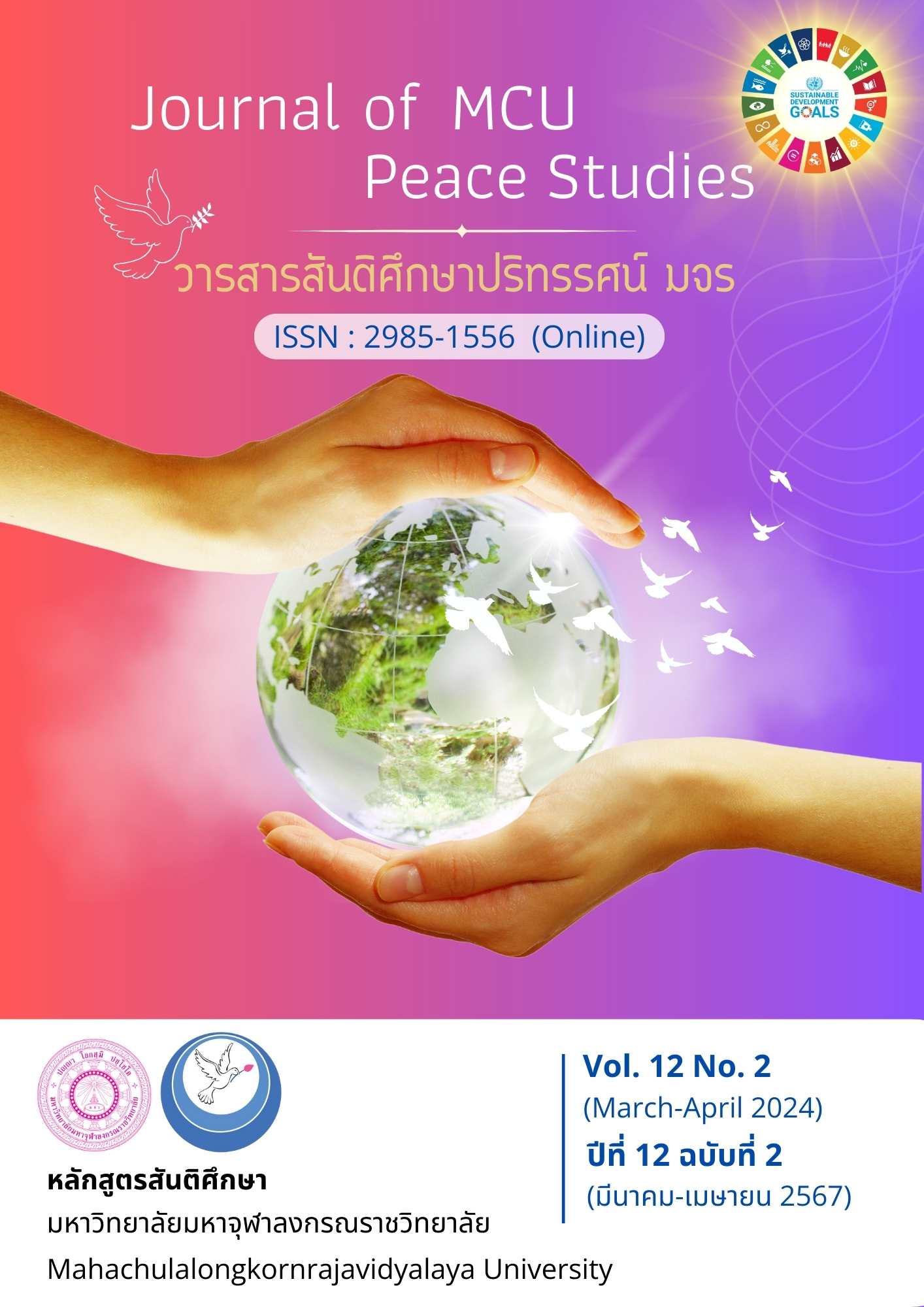Management Process of Phra Khanong Criminal Court in the Administration of Justice by Buddhist Peaceful Means
Main Article Content
Abstract
This research, the Management Process of Phra Khanong Criminal Court in the Administration of Justice by Buddhist Peaceful Means, is developed in the form of Research and Development (R & D), and has three objectives as follows: 1. To study contexts, problems, causes, and needs of the Management Process of Phra Khanong Criminal Court in The Administration of Justice by Buddhist Peaceful Means; 2. To integrate the Mangement Process of Phra Khanong Criminal Court in The Administration of Justice by Buddhist Peaceful Means; 3. To demonstrate the Management Process of Phra Khanong Criminal Court in The Administration of Justice by Buddhist Peaceful Means.
The results of this research indicate as follows: 1. Phra Khanong Criminal Court It is a court of first instance in Bangkok. Located at 379 Sanphawut Road, Bangna Tai Subdistrict, Bangna District, Bangkok Established in accordance with the Establishment Act. Establishment of the Taling Chan Civil Court Phra Khanong Civil Court Minburi Civil Court Taling Chan Criminal Court Phra Khanong Criminal Court and the Minburi Criminal Court 2019 has the authority to consider criminal cases that are provincial and subdistrict cases, located in Bangna Subdistrict, Bangna District, Bangkok. Due to the Coronavirus (COVID-19) pandemic in 2019, court hearings in the Phra Khanong Criminal Court have been adjourned for several times, resulting in the number of pending cases exceeded the limit set by the Office of the Judiciary Secretary. 2. Phra Khanong Criminal Court shall be administered by Buddhist Peaceful Means. This aims to allow judicial officers in the Phra Khanong Criminal Court and mediators of the Phra Khanong Criminal Court work with satisfaction, diligence, perseverance, and not being discouraged by difficulties. They shall apply their knowledge and ability to perform their duties and to solve problems in order to ensure justice for the people, according to the policy assigned by the President of the Supream Court, the Office of the Judiciary and the Chief Judge of the Phra Khanong Criminal Court. 3. The Mangement Process of Phra Khanong Criminal Court in The Administration of Justice by Buddhist Peaceful Means involves judicial officers and mediators of the Phra Khanong Criminal Court by means as follows: A. To create positive thinking: judicial officers of the Phra Khanong Criminal Court shall apply the Rddhippada; Four Foundations for accomplishment; 4 Bhavana Principles, integrated with PDCA Cycle, in order to increase their moral to assist people who have cases in Phra Khanong Criminal Court, for example, practicing dhamma and mind developing program, capacity-building for judicial officers and mediators of the Phrakanong Criminal Court. B. To administer justice; for example, (1) continuous hearings, (2) protection of rights and liberties of injured persons, accused and defendants, (3) conciliation and mediation in criminal cases, and (4) out of office hours hearing sessions. These programs render case administration more efficient; and C. To build trust and faith in the Court of Judiciary and the Phra Khanong Criminal Court. Judicial officers of the Phra Khanong Criminal Court, being satisfied with working conditions, shall assist willingly and collectively people who comes to the Phra Khanong Criminal Court for help. In return, these people will feel satisfied in managing their cases, as well as receiving justice from the Phra Khanong Criminal Court. This will eventually result in people love and have faith in the Court of Judiciary and the Phra Khanong Criminal Court.
Article Details

This work is licensed under a Creative Commons Attribution-NonCommercial-NoDerivatives 4.0 International License.
Views and opinions expressed in the articles published by The Journal of MCU Peace Studies, are of responsibility by such authors but not the editors and do not necessarily reflect those of the editors.
References
Court of Justice. (2022). Policy of the President of the Supreme Court. Retrieved June 15, 2022, from http://www.coj.go.th/th/content/page/index/id/167848
Drug and Medical Supply Information Center, Ministry of Public Health. (2022). Office of the Center for Situation Administration on the Outbreak of Coronavirus Disease 2019 (COVID-19). Retrieved June 15, 2022, from https://dmsic.moph.go.th/index/detail/8064
Office of Judicial and Legal Affairs. (2020). Guidelines for Using Information Technology Systems to Examine Witnesses' Confessions via Video Conferencing. Retrieved June 20, 2022, from https://jla.coj.go.th/th/content/category/detail/id/1601/iid/186554
Office of the President of the Supreme Court. (2022). Office of the President of the Supreme Court. Retrieved June 15, 2022, from https://opsc.coj.go.th/th/content/category/detail/id/1/iid/128463
Phra Uthai Jaruthammo (Kaenjumpa). (2023). The Development Guidelines of Administrative Competency in Accordance with Itthibada 4 Principle of the Plubplachai Subdistrict Administrative Organization, U Thong District, Suphanburi Province. Acdemic Journal of Phetchaburi Rajabhat University, 13(1), 42-51.
Phrakhanong Criminal Court. (2022). Personnel. Retrieved June 20, 2022, from https://crimpkc.coj.go.th/th/content/category/detail/id/22/iid/332328
Phrasamuh Pongsathon Papangaro (Tumcha). (2021). An Application of the Four Paths of Accomplishment for the Work Administration of Kut Jub Municipality in Kut Jub District, Udonthani Province. (Master’s Thesis). Mahachulongkornrajavidyalaya University. Ayutthaya.
The Court of Appeal. (2022). Strategic plan for the Court of Justice. Retrieved June 15, 2022, from https://appealc.coj.go.th/th/file/get/file/2021102099ac10bcfa1bdd3547757e91472c3d24160841.pdf
Ubonrat, M. (2022). Iddhipada 4: To Increase the Efficiency and Happy Work. Journal of Interdisciplinary Innovation Review, 5(2), A150-A161.


